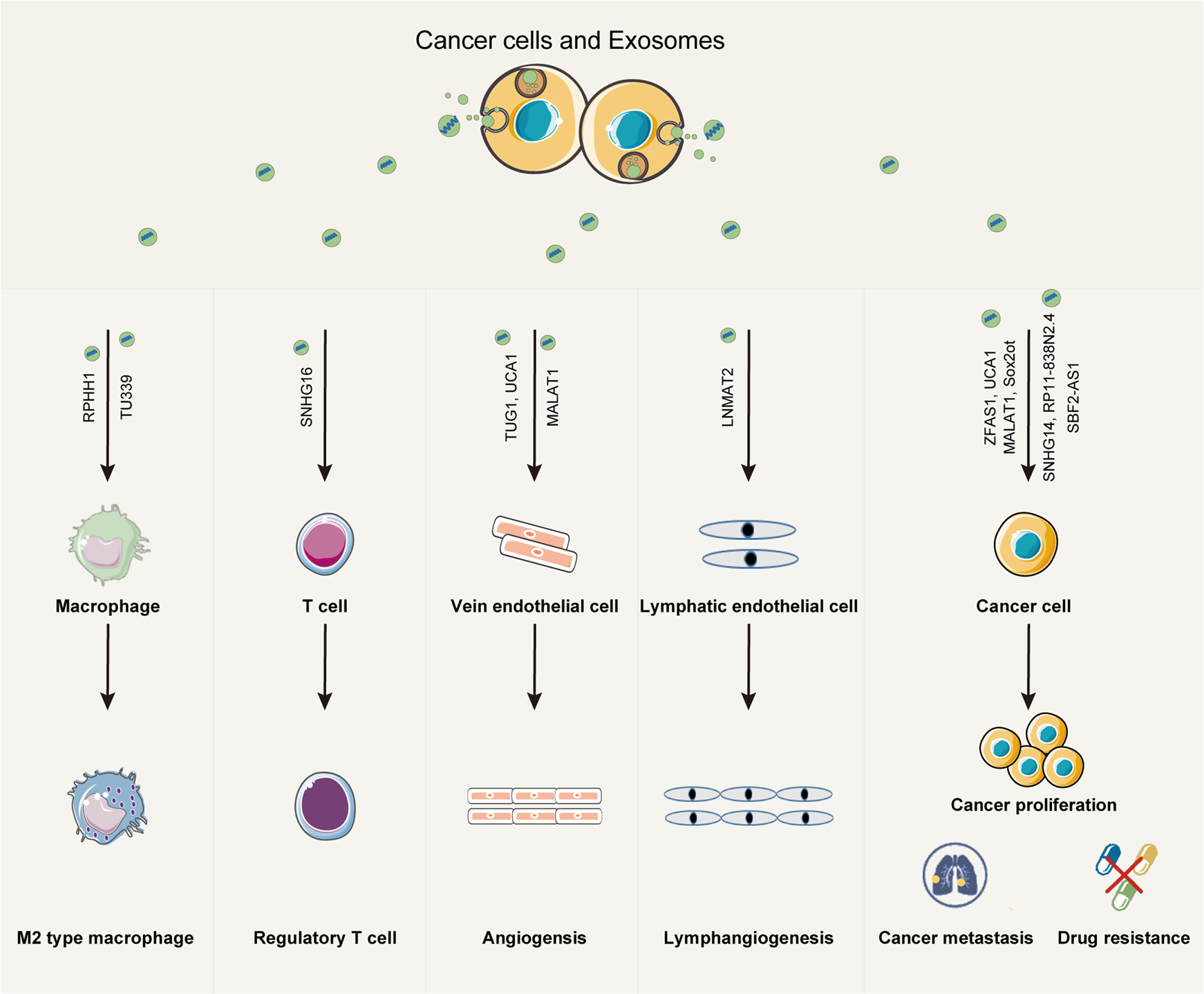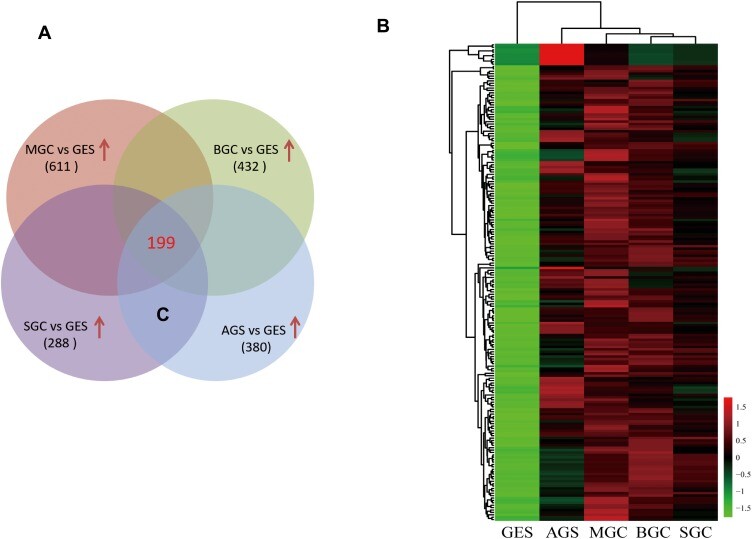Exosomal LncRNA Microarray Service
Exosomal LncRNA Microarray Service utilizes high-sensitivity microarray technology to systematically analyze the expression profiles of long non-coding RNAs (lncRNAs) within exosomes. It provides precise insights into the regulatory mechanisms of lncRNAs in biological processes such as intercellular communication and disease progression, offering robust data support for biomarker discovery, disease diagnosis, and therapeutic target identification. Long non-coding RNAs (LncRNAs), defined as RNA molecules longer than 200 nucleotides that do not encode proteins, are widely involved in gene expression regulation, epigenetic modulation, and signaling pathway control. Recent studies have confirmed that LncRNAs are closely associated with the onset and progression of various diseases, including cancer, cardiovascular diseases, and neurological disorders.
Meanwhile, exosomes, as nanoscale vesicles derived from cells, encapsulate and transport LncRNAs in a stable form, playing vital roles in cell-to-cell communication and the disease microenvironment. Since exosomes can be non-invasively obtained from body fluids such as blood, urine, saliva, and cerebrospinal fluid, the LncRNAs they carry have emerged as an ideal new generation of non-invasive molecular biomarkers with immense research and clinical translational value.

Zhang, W. et al. Exp Mol Med. 2021.
Figure1. The Role of Exosomal lncRNAs in Cancer Biology
However, exosomal LncRNA research faces two major technical challenges: first, the extremely low RNA content in exosome samples, which exceeds the detection limits of conventional methods; second, the high heterogeneity of LncRNAs, which makes high-throughput screening difficult using standard sequencing technologies. To comprehensively explore the potential of exosomal LncRNAs in disease mechanisms and biomarker development, MtoZ Biolabs provides the exosomal LncRNA microarray service to offer researchers worldwide an efficient and accurate solution for profiling exosomal LncRNA expression, supporting biomarker screening, molecular mechanism studies, and precision medicine research.
Service at MtoZ Biolabs
MtoZ Biolabs' Exosomal LncRNA Microarray Service utilizes a high-throughput LncRNA microarray platform, combined with advanced exosome isolation and purification, RNA extraction, and high-sensitivity fluorescent hybridization techniques, to provide comprehensive profiling of LncRNAs in exosomes. We offer a complete, end-to-end service that includes exosome extraction, RNA preparation, microarray analysis, and data interpretation. Our service supports differential LncRNA expression screening, bioinformatics-based functional annotation, and downstream validation. MtoZ Biolabs' Exosomal LncRNA Microarray Service is ideal for biomarker discovery, molecular mechanism studies, and precision medicine development. It addresses the challenge of efficiently and comprehensively detecting exosomal LncRNAs, helping researchers identify disease-associated non-invasive molecular biomarkers and advancing liquid biopsy and translational medicine research.
Analysis Workflow
1. Sample Pre-processing
Compatible with various biological samples including serum, plasma, cell culture supernatants, cerebrospinal fluid, with standardized collection and transport guidelines.
2. Exosome Isolation and Purification
Standardized procedures with quality control reports including NTA particle size analysis and electron microscopy characterization.
3. RNA Extraction and Quality Control
Column-based combined isolation technology, integrity assessed via Agilent Bioanalyzer.
4. Microarray Hybridization and Detection
Agilent SureScan microarray system for fluorescent labeling, hybridization, washing, and signal acquisition.
5. Bioinformatics Analysis
Standard reports including differential expression analysis, co-expression network construction, functional enrichment analysis, and customized data mining support.
Service Advantages
✅ High Sensitivity and Throughput: Advanced LncRNA microarray platform ensures highly sensitive and comprehensive profiling of low-abundance exosomal LncRNAs, delivering reliable and complete datasets.
✅ End-to-End Customized Service: Full-process standardized operations from exosome isolation, RNA extraction, microarray detection to data analysis and report delivery, meeting diverse research needs and saving clients time and resources.
✅ Extensive Exosome Handling Experience: Rich expertise in isolating and purifying exosomes from various body fluids (plasma, urine, saliva, cerebrospinal fluid), ensuring high-quality exosome samples adaptable to different sample types and research purposes.
✅ In-Depth Data Analysis and Interpretation: Professional analysis including differential expression, GO/KEGG pathway enrichment, LncRNA-disease association studies, supporting deep functional insights and clinical relevance for high-quality publications.
✅ One-Time-Charge: Transparent pricing with no hidden fees or additional costs.
Applications
Exosomal LncRNA microarray analysis is widely used in both basic research and translational medicine, covering the following typical applications:
1. Cancer Biomarker Discovery
Identification of exosomal LncRNAs for early cancer screening, diagnosis, prognosis, and recurrence monitoring, enabling novel liquid biopsy strategies.
2. Neurodegenerative Disease Research
Analysis of LncRNAs related to diseases such as Alzheimer's and Parkinson's to uncover early mechanisms and identify novel therapeutic targets.
3. Cardiovascular Disease Mechanism Elucidation
Exploration of exosomal LncRNA regulatory networks associated with myocardial infarction, atherosclerosis, and more, aiming for new prognostic and therapeutic markers.
4. Immune and Autoimmune Disease Studies
Investigation of the immune regulatory roles of exosomal LncRNAs in diseases like rheumatoid arthritis and systemic lupus erythematosus.
5. Drug Response and Therapeutic Mechanism Research
Understanding the molecular mechanisms of drug resistance and treatment response mediated by exosomal LncRNAs to advance precision medicine strategies.
Case Study
Exosomes, as carriers of active molecules including LncRNAs, participate in cell communication and are considered promising candidates for disease diagnostics. This study aimed to identify gastric cancer (GC)-specific exosomal LncRNAs and evaluate their potential diagnostic value in plasma. Exosomes were isolated from the culture medium (CM) of four gastric cancer cell (GCC) lines and human gastric epithelial cells. Exosomal RNA was extracted and subjected to LncRNA microarray analysis to identify GC-specific exosomal LncRNAs. Results showed that 199 exosomal LncRNAs were significantly upregulated in GCC compared to controls. qRT-PCR confirmed that lnc-SLC2A12-10:1 was significantly elevated in exosomes from both GC patients and GCC lines. Notably, exosomal lnc-SLC2A12-10:1 levels were significantly correlated with tumor size, TNM stage, lymph node metastasis, and differentiation grade. Postoperative exosomal lnc-SLC2A12-10:1 expression was reduced compared to preoperative levels. These findings suggest that exosomal lnc-SLC2A12-10:1 may serve as a potential non-invasive biomarker for GC diagnosis and prognosis. Further large-scale studies are needed to validate its role in GC progression.

Zheng, P. et al. OncoTargets and Therapy.2020.
Figure2. Screening of Upregulated GC-specific Exosomal LncRNAs According to LncRNA Mcroarray Assay
FAQ
1. Can MtoZ Biolabs handle low-concentration or hard-to-isolate body fluid samples (e.g., urine, cerebrospinal fluid) for exosomal LncRNA analysis?
A: Yes. MtoZ Biolabs has extensive experience in exosome isolation and RNA extraction. We can optimize isolation protocols for low-concentration and complex fluids (such as urine, cerebrospinal fluid, amniotic fluid), ensuring high-quality exosomal RNA for successful LncRNA microarray analysis and reliable results.
How to order?







